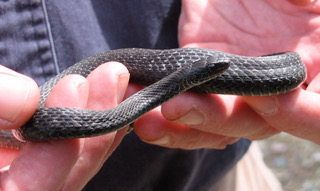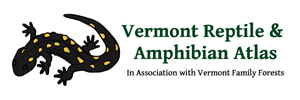
Herp Update: Historic Snake Reports, Fundraiser – February 7, 2023
Current Herp Activity?
I have not received any reports of Vermont reptiles and amphibians moving on the surface so far in February. This is how it should be for early February. Still we received an unusual report from New Hampshire of a small group of frogs overwintering in a wet basement.
Some of the data we receive at this time of year arrive in the form of annual reports of studies from the previous year. For example, retired Vermont Fish & Wildlife non-game biologist Steve Parren sends us annual reports of a population of Wood Turtles that he is particularly interested in. We keep these reports on file and also sift through them and pull out individual sightings for our database.
I was really pleased just yesterday to receive the most recent of many historic reports from Gail Lynde. Gail combs through historic publications (mostly old newspapers) for historic reports of reptiles and amphibians in Vermont, particularly snakes. I have attached her most recent find. It comes from a New York paper but quotes an earlier article in the “Brattleborough Eagle” in 1852. You will see in the article that the species is simply referred to as “black snakes” and there is a clear negative attitude toward the “loathsome race”. Thankfully, it is an attitude that is far less common in Vermont today. Based on the sizes reported, the behavior, and the location, we assume the snakes referred to here are North American Racers. This species has not been reported in this state since 2014. Habitat loss, fragmentation, and this sort of persecution are the suspected causes of its decline.
As a general rule if someone refers to a large “black snake” in western Vermont it is most likely an Eastern Ratsnake. If the report comes from southeastern Vermont, the observer has probably seen a North American Racer. Their ranges in Vermont do not overlap. That said, large adult Common Watersnakes are almost entirely black as well and they are found in both areas. We have received reports of Eastern Ratsnakes that turned out to be Common Watersnakes.
We once checked out a population of “black snakes” from southeastern Vermont that we were hoping were part of a previously unknown population of North American Racers. These snakes turned out to be melanistic (all black) Common Gartersnakes. Melanism (all black, extra melanin), like albinism (all white, no melanin) turns up occasionally in almost any vertebrate, but it is very rare. We have only received three reports of melanistic Common Gartersnakes. I will attach a photo of one.
Our Annual Fundraiser Continues
We continue to receive your generous donations through our annual fundraiser, but we still have a long ways to go before we reach our goal. We will run the fundraiser through the end of this month and then take down the GoFundMe site, though we certainly accept donations through other means at any time of the year. Your contributions make up the largest portion of our annual budget. The rest comes from grants and cost-share agreements. Please do consider making a donation if you have not already done so. For more information visit:
https://www.vtherpatlas.org/support-and-funding/annual-fundraiser/
Donations can be made in a variety of ways:
- Through our GoFundMe site (they take 2.9 percent of the payment plus 30 cents per transaction)
- By using the PayPal link on our website (they take 2.9 percent of the payment plus 30 cents per transaction)
- By writing a check made out to James S. Andrews (no overhead is lost but it is not tax deductible). Send the check to: The Vermont Reptile and Amphibian Atlas, 642 Smead Road, Salisbury, VT 05769
- If you would prefer, or if your fund requires that your donation be made to a 501c3 not-for profit you can write a check made out to Vermont Family Forests (VFF). VFF is our fiscal sponsor and they are a registered 501(c)3 non-profit (they do take 15% for overhead costs).
- If you write a check to VFF we prefer that you still address it to: The Vermont Reptile and Amphibian Atlas, 642 Smead Road, Salisbury, VT 05769.
- However, if your fund requires that the check be sent directly to Vermont Family Forests, make sure to make it clear that the donation is for the Vermont Reptile and Amphibian Atlas and send the donation to: Vermont Family Forests, David Brynn, Executive Director, P.O. Box 25, 14 School Street, Suite 202A, Bristol, VT 05443



